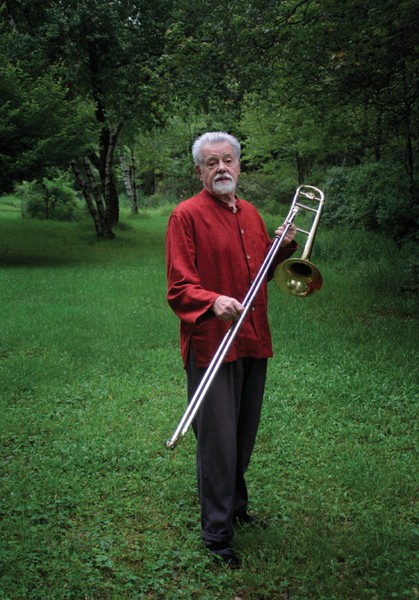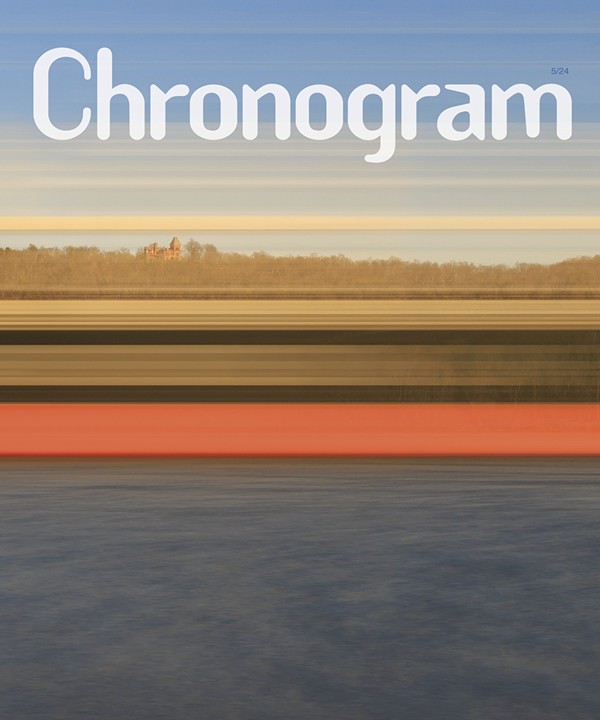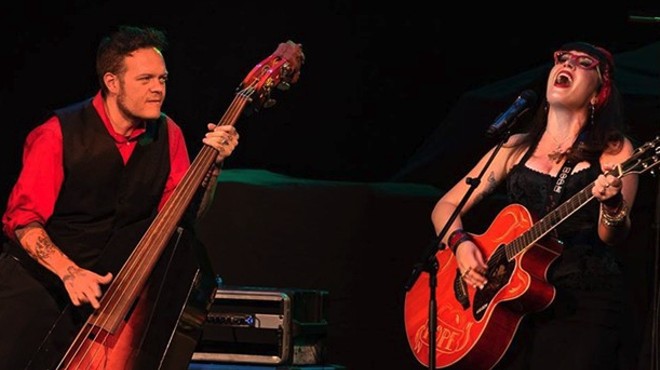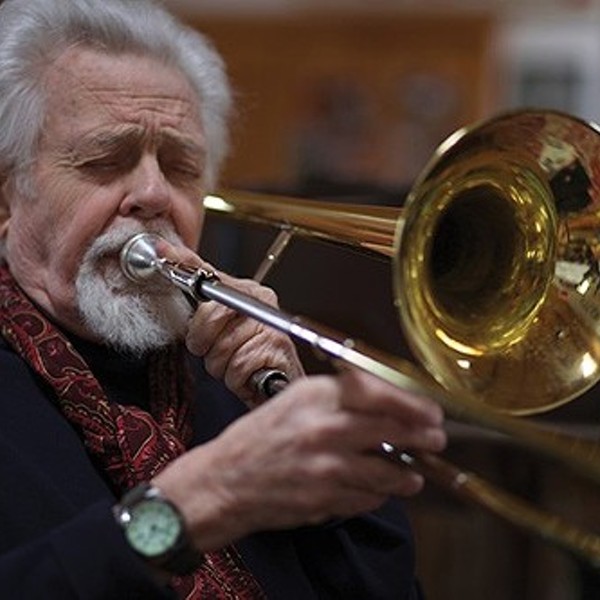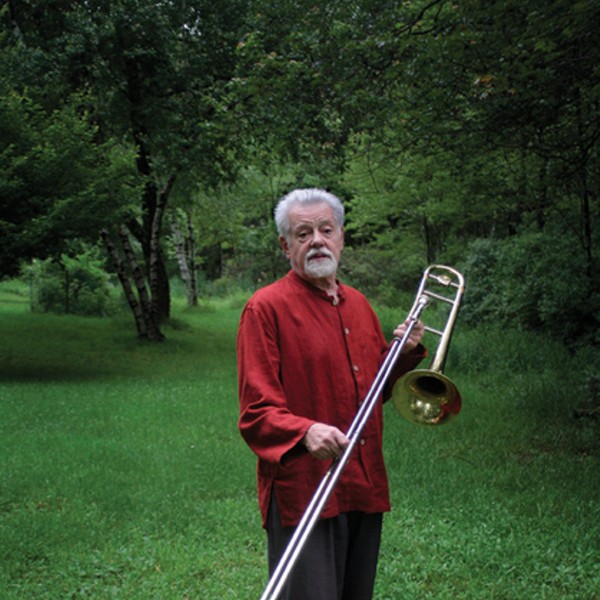Peaceful isn’t the word for the 21 acres that envelop the Kerhonkson house trombonist Roswell Rudd inhabits with Verna Gillis, his companion and manager. Thick with tall pines and hearty brush, the striking stillness of the property is troubled only by the occasional cheeping bird. It’s a meditator’s dream spot. But to Rudd, he and Gillis are surrounded not just by nature, but also by music.
“There’s some really great notation out there,” says the goateed, professorly composer as he glances toward his living room window. “I love to grab my horn and go out in the woods, play what I see and feel.”
Notation? Where? And how, exactly, does one “play” the natural environment?
“I have an expanded concept of what notation is,” explains Rudd. “I call it landscape notation; it’s about moving beyond the traditional system of just playing specks on a piece of paper. Music is naturally in the atmosphere all around you, all the time. It’s just a question of using your eyes, your ears, and your other senses to make the tune. Besides the sounds that you hear—the birds, the wind—there’re other dimensions to draw on: the colors, the shapes, the textures, the feelings you get. I approach the notes I find in nature the same way as the ones I see when I’m playing something off the page.”
It’s a curious concept, to be sure, but one that seems to be working perfectly when you get an earful of the man’s bold and forward-looking craft. At 74, Rudd is known as the father of free jazz trombone and a pivotal figure of the 1960s and ’70s avant-garde; he’s also an acclaimed cultural synthesist, having recorded and performed with leading indigenous folk musicians from around the world. But for all of his oddly metered, hard-blowing iconoclasm, Rudd began his musical journey in his hometown of Lakeville, Connecticut, on some very traditional ground: Dixieland.
“I took piano lessons when I was really young, but when I heard my dad’s Louis Armstrong 78s, I said, ‘This is what I wanna be doing!’” Rudd says. When he was 12, after he’d studied French horn for a few years, Rudd’s parents, both casual musicians, had an uncle buy the boy a pawnshop trombone. By the time he was a student at Yale in the mid 1950s he was playing tailgate in Eli’s Chosen Six, a Dixieland revival band. “That was something, playing rags and stomps for drunk college kids,” Rudd recalls with a laugh. “But we’d improvise as much as we could, throw in five or six extra choruses on ‘Royal Garden Blues,’ let everyone take a turn. It was pretty loose. You know, party music.”
Although his chosen instrument’s inherent lack of flexibility didn’t lend itself well to bebop—outside of the great J. J. Johnson, Frank Rosolino, and Jimmy Cleveland, bop trombonists were few—Rudd nevertheless graduated to the more demanding style, studying with trail-blazing pianist Herbie Nichols for two years. “One thing I learned from Herbie and the other bop pianists, like Monk and Bud Powell, is that you can transpose their tunes from the keyboard for a whole orchestra,” says Rudd. “Each finger can represent a potential instrument.” It was this very concept that lead to the formation of his next band, a Thelonious Monk repertory ensemble, retroactively dubbed the School Days Quartet, which also featured influential soprano saxophonist Steve Lacy, whom Rudd had met in his Dixieland days. But it wouldn’t be long before he’d take the plunge into complete musical freedom.
In New York full time by the early 1960s, Rudd sought out pianist and free jazz pioneer Cecil Taylor for lessons on theory and briefly played with radical saxophonist Archie Shepp in a band led by trumpeter Bill Dixon. In 1964 he contributed to the soundtrack of the underground jazz film New York Eye and Ear Control and with saxophonist John Tchicai founded the New York Art Quartet; the short-lived but hugely influential outfit recorded for the famed ESP-Disk imprint and performed at that year’s galvanizing October Revolution in Jazz festival at the Cellar Café. “There was a new spirit in the musical atmosphere, for sure,” remembers Rudd. “What [Rudd and his cohorts] were doing was maybe too edgy for a lot of people, but to me it was just updated Dixieland. Like the original New Orleans jazz, it was collective improvisation, but it was informed by bebop and everything else that had come in between. And it was great to find comrades like Archie [Shepp], Carla Bley, and other folks to work with.”
After the quartet dissolved, Rudd joined Shepp’s band and went on to lead his own recording dates and perform with saxophonist Gato Barbieri, Charlie Haden’s Liberation Music Orchestra, and the Primordial Quartet, a unit that also starred alto saxist Lee Konitz and Creative Music Studio founder Karl Berger on vibes and piano. In the years following he composed for and worked with the Jazz Composer’s Orchestra and cut well-received LPs for such seminal labels as Black Lion, WATT, Arista/Freedom, and Soul Note. By the mid 1970s, however, Rudd’s artistic career began to take a backseat to academics as he taught ethnomusicology at Bard College and the University of Maine at Augusta. In the ’80s he supplemented his income by doing delivery work and by playing in the house band of the now-defunct Granit Hotel resort, where he backed up visiting vaudeville acts and Borscht Belt staples like comedians Milton Berle and Pat Cooper. “There were some unknown [performers] that were really good too, actually,” Rudd says. “But no matter who [the band was] working with, I always found a way to sneak in some improvisation.”
During his career-forging years in New York Rudd had also begun a long association with the legendary folklorist Alan Lomax, another personality who would profoundly shape his musical path. For over 30 years, he assisted the folk-song collector by analyzing field recordings from around the world using cantometrics, a system of organization devised by Lomax and musicologist Victor Grauer. “Cantometrics helps you break down any kind of music from any culture into its fundamental parts by using 35 parameters, or different qualities,” says Rudd. “I’d listen to tapes and group them according to the commonalities that I heard between performances taken from different tribes or villages or other social groups. It’s the best system anybody who wants to understand world music, classical music, pop music, whatever, can use. I really learned a lot from working with [Lomax]. I saw the potential to be part of something bigger through world music and to get even deeper into improvisation, since that element is so much more dominant in other cultures. It became my dream to play and record with folk musicians from those cultures.”
And it was Gillis, whom Rudd had met in the early 1970s when she was a student under Lomax at Goddard Univeristy, who would later help to make this dream a reality. After receiving her PhD, Gillis began her calling as a Grammy-nominated world music producer by recording indigenous artists in Africa, the Middle East, the Carribean, and South America before opening Soundscape, a multicultural performance space in New York. She oversaw the production of some 25 recordings for the Smithsonian Folkways and Lyrichord labels and launched her own logo, also called Soundscape, in 1986; she has been instrumental in developing the careers of Youssou N’Dour, Paquito D’Rivera, and Salif Keita, among others. Throughout the decades she and Rudd kept in contact and, several years after each of their spouses had passed away, the two began their relationship. It was through Gillis that Rudd contacted Malian kora player Toumani Diabate, a connection that led to performances in Diabate’s homeland and the recording of MALIcool (2003, Universal/Sunnyside Records), an astonishing, critically exalted album that pairs the trombonist with Diabate and other native Malian players. More engagements in Africa, as well as Asia, Siberia, and other regions, have followed, along with further recordings with world musicians, such as 2005’s Blue Mongol (Soundscape/Sunnyside Records), a sublime coupling with the throat-singing Mongolian Buryat Band, and 2006’s El Espiritu Jibaro (Soundscape/Sunnyside), a duet with Puerto Rican cuatro player Yomo Toro.
“I have a nickname for Roswell: Big Ears,” says Gillis. “He can pretty much parachute in anywhere with his trombone and play with any musicians he meets. I’ve worked with musicians from all kinds of backgrounds over the years and so many of them are too deeply rooted in their own traditions to be able to play well with ousiders. Roswell doesn’t have that problem at all. He can instantly have a [musical] conversation with anyone, whether it’s Michel Doucet avec Beusoleil or [Peking Opera singer] Li Xiaofeng.”
Rudd’s newest Soundscape effort is this year’s Trombone Tribe, which through its program of gospel, bop, funk, Latin, and even New Orleans-flavored workouts represents somewhat of a return to the “party music” of the leader’s roots. As one might surmise from its name, however, what makes the disc most unusual is the band’s lineup: In addition to veteran players Henry Grimes (bass), Bob Stewart (tuba), and Barry Altschul (drums), the cast is a veritable all-star team of Rudd’s contemporaries on his instrument: Eddie Bert, Wycliffe Gordon, Steve Swell, Deborah Weisz, Sam Burtis, Ray Anderson, and Josh Roseman—a sliding, slurring crew that really goes to town on ingeniously titled rump-rollers like “Bone Again with Bonearama” and “Slide and the Family Bone.”
“It’s very unusual to get to play with someone who inspired you to play in the first place,” says Swell, who has also performed with Lionel Hampton, Buddy Rich, and William Parker and leads the band Slammin’ the Infinite. “I first heard Roswell when I was 15, on [Archie Shepp’s 1966 Impulse! Records album] Live in San Francisco, and I thought, ‘That’s the way to play the trombone!’ I finally got to meet him when I was 19, and then I became his student. He’s been my mentor ever since, which has just been amazing for me.”
“A lot of people have called jazz ‘America’s classical music,’ and I believe it really is,” says Rudd. “But there’s something else to it, another level, something that I’d feel when I went to hear Miles or Monk. I call it ‘high American musical theater.’”
If such a theater exists, Roswell Rudd has surely been cast in one of its leading roles.
Roswell Rudd will play two shows at Maverick Concerts in Woodstock on July 18: a children’s program at 11am, and “An Evening of Jazz Explorations” with the Trombone Tribe at 8pm. www.maverickconcerts.org. Trombone Tribe is out now on Soundscape/Sunnyside Records. www.roswellrudd.com.







